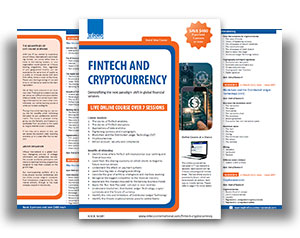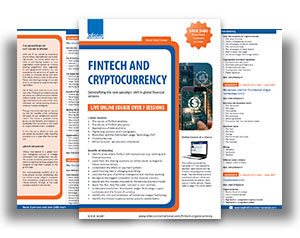FinTech and Cryptocurrency (Online Course)
WHEN
TBA
WHERE
Live Online Course
Introduction
This course tells the story of enablers and disruptors in the financial industry. Bill Gates in 1994 made the following statement: ‘Banking is necessary, banks are not’.
By now, we are in the midst of a technological revolution that is fundamentally altering the way we live, work and relate to one another. Its scale, scope and complexity will create a transformation humankind has not experienced before (adapted from Klaus Schwab, WEF). Whilst we do not yet know how this will unfold, we do get a sense of direction. The First Industrial Revolution used water and steam power to mechanise production. The Second used electric power to create mass production. The Third used electronics and information technology to automate production. Now a Fourth Industrial Revolution is characterised by a fusion of technologies that is blurring the lines between the physical, digital, and biological spheres.
Industry 4.0 is affecting the financial industry already. Whilst banks are using technology to improve and automate their services to clients, $4.7 trillion in revenue is at risk of being displaced by new technology-enabled entrants. FinTech is changing rapidly with new sub-sectors emerging all the time, drawing in new names and organisations who are taking a customer centric view of financial services. Already, the coffee shop across the street has moved from being a user to a provider of financial services.
Curious to find out how this works?
What are you and your organisation doing about this?
Is your business able to cope with the continuous reduction in fees and revenues whilst expenses for digitalisation rocket?
How are you innovating your business model to be able generate revenue from alternative sources?
This course provides an overview of the current status quo and aims to ask the right questions to adjust to the business model to survive in the future. Furthermore, you will understand the technological breakthrough to digitalise assets, starting with currencies.
Overview
This is a live online course running over seven sessions. The first two sessions cover FinTechs that enable and disrupt existing banking practices by using the possibilities of technology. You will identify new challengers that disrupt the status quo. You will see how Alibaba and Starbucks affected payments and how they became a financial services company. You will focus on the risks and opportunities, but mostly, you will identify where the next gold mine lies for financial institutions.
From here, we will look at data analytics and what banks have done in the space of systems architecture, payment analytics, behavioural analytics and using neuroscience. All the above requires digital payment solutions. This begs the question on how to create a digital currency. With blockchain and cryptocurrencies on the rise, the following sessions explain the underlying mechanisms. Firstly, we must understand the basics of cryptography. Then, we must understand the Digital Ledger Technology (DLT). In order to master the workings, we breakdown the Digital Ledger Technology into its hashes and blocks before chaining them together to the blockchain. Then we compare Bitcoin to other cryptocurrencies. During the course, you will be given free bitcoin to set up a crypto wallet and make some first payments to your peers. After checking out pitfalls and risks, we end the course with a game reinforcing all the learnings. We encourage critical thinking in participants and present the latest knowledge in this area.
Benefits of Attending
- Identify areas where FinTech will revolutionise your banking and finance business
- Learn from the sharing economy on which clients to target to future revenue stream
- Understand the attack on payment systems
- Learn how big data is changing everything
- Describe the goal of artificial intelligence and machine learning
- Recognise the biggest competitor to the financial industry
- Appreciate the changes required to the banking business model
- Apply the ‘Buy Now Pay Later’ concept to your business
- Understand blockchain, Distributed Ledger Technology, cryptocurrencies and the future of currency
- Identify the risks and limitations of Distributed Ledger Technology
- Identify the threats cryptocurrencies pose to central banks
Live Online Course – How It Works
The structure of our virtual learning program is designed to keep the same levels of engagement and networking as our on-site public courses. Course content is delivered through our easy-to-use online learning platform and is supplemented by case studies and practical exercises.
Like our classroom-based public courses, you will have live interaction with our course facilitators and other participants. Our live online courses are led by our experienced instructors, who will provide you with easily digestible content, using knowledge learned from many years in the industry, during scheduled times. Delegates will receive copies of the course materials electronically.
This course is scheduled to take place over 7 live online sessions using virtual learning technology.
Course Agenda
Session 1: 9 March 2022, 8am – 11am GMT
The Stories of FinTech Enablers
- Introduction
- The 4th Industrial Revolution
- The digital early birds and their impact
- Growth of FinTech
- Banking the future – The digitally enabled bank
- Digitalisation of the existing business model in Finance
Session 2: 10 March 2022, 8am – 11am GMT
The Stories of FinTech Disruptors
- Team Exercise: FinTech challengers across traditional business lines
- The silent disruption
- Example: High-frequency dark pool
- Team Exercise: Big data and how it applies to Banking & Finance
- Video Exercise: AI and machine learning
- Case Study: AI in Finance
- Digitalisation of the banking business model: the real disruption
- How to regulate the FinTech industry
- Implications of FinTech for banks and financial services
Session 3: 11 March 2022, 8am – 11am GMT
Applications of Data Analytics
- Payment analytics
- Behavioural analytics and engagement
- Neuroscience
- The BIAN implementation journey
Session 4: 14 March 2022, 8am – 11am GMT
Digitalising Currency and Cryptography
- From fiat currencies to cryptocurrencies
- Cryptography and digital signatures
Session 5: 16 March 2022, 8am – 11am GMT
Blockchain and the Distributed Ledger Technology (DLT)
- How does the blockchain work?
- Blockchain demo
- Mining
- Different miners (videos)
Session 6: 22 March 2022, 8am – 11am GMT
Cryptocurrencies
- Cryptocurrencies
- Types of cryptocurrencies
- Initial coin offerings (ICO)
- Security issues
- Proof
Session 7: 23 March 2022, 8am – 11am GMT
Your Bitcoin Account, Security and Compliance
- Setting up your own cryptocurrency account
- Exercise: Setting up your own wallet, and then transferring to your peer
- Practical issues
- The programmable nature of the blockchain
- Applications of the Distributed Ledger Technology (DLT)
- What next?
- End game
Training Methodology
The agenda will combine presented materials with plenty of opportunity for Q&A, interactive discussions, and the use of quantitative models to illustrate key learning points. Current market examples and data are utilised wherever helpful.

Pre-Course Questionnaire
We would like to customise the workshop based on your specific needs. Pre-Course Questionnaire will be sent prior to the workshop for analyse in advance and to be addressed during the course.

Course Certificate
Upon the successful completion of this course, you will receive a Certificate of Completion bearing the signatures from both the Course Director and the Course Organiser. This Certificate will testify your endeavour and serve towards your professional advancement.
Who Will Attend
- Financial institutions
- Central banks
- Ministry of Finance
- Regulators and authorities
- Securities and investment commissions
- Investment firms
- Insurance and Treasury centres
- Financial Technology solution providers
You Might Also Be Interested In
ESG & Sustainable Finance (Online Course)
Explore the strategic implications of ESG and Sustainable Finance on the financial industry and learn how technology offers competitive advantages in transforming into a sustainability-driven organisation
Dates To Be Announced
FinTech & Artificial Intelligence (Online Course)
Mastering the strategic implications of FinTech and AI, and learn how cross-industry digital value chains can improve existing business models
Dates To Be Announced
Renewable Energy Project Finance & Financial Modelling (Online Course)
Techniques & models for bankable green energy transactions of solar, wind, hydro, biomass & geothermal power investments in today’s competitive energy markets








